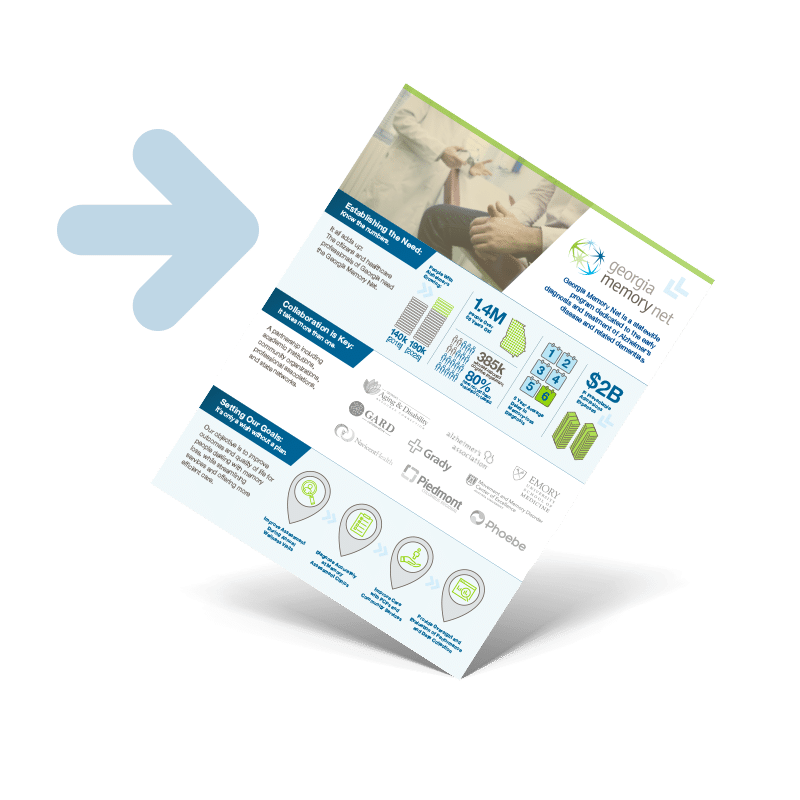Alzheimer’s Three Stages: What to Expect
Alzheimer’s caregivers face a hard journey when their loved one is diagnosed with dementia. One of the core philosophies of Georgia Memory Net is clear and honest communication to make sure that you’re prepared for the road ahead. With the right information, you can ensure the best possible care, comfort and support for your family member, and also take care of your own physical and emotional stability in the process. With that in mind, understanding Alzheimer’s three stages will help you plan and prepare for the future.
The average timeframe for the disease to run its course is 4-8 years, with some patients living as long as 20 years. Alzheimer stages include mild, moderate and severe, and correlate to early, middle and late stages of the condition. It’s important to remember that this is a general guide only. Each person will experience Alzheimer’s symptoms differently and will progress through the stages of Alzheimer’s in their own unique way. Some Alzheimer stages may even intersect, and it might be a challenge to determine what stage a person is currently living through.

Stages of Alzheimer’s
Mild
A patient can still function at this stage. Driving, working, social engagements are all activities that a person, depending on how well they are functioning, may still be possible. There are many Alzheimer’s symptoms that are common markers to this stage of the disease including:
- Struggling to remember the right word or name of some person/object during a conversation.
- Remembering names when meeting new people during social situations.
- Struggling to perform tasks during work or social activities that were not previously a problem.
- Reading something, and then being unable to recall what was read.
- Losing or misplacing something that is very important.
- Planning, organizing or troubleshooting events or activities become a challenge.
These Alzheimer’s symptoms may increase to the point of being noticed by friends and family members. If someone with these signs has not already been screen for Alzheimer’s, it’s imperative that they go see a clinician. Alzheimer’s screening can identify issues with memory and concentration that are difficult to spot at first. Remember, your loved one could have a condition other than Alzheimer’s that is treatable, so it’s very important to get tested.
Moderate
This is typically the longest phase of Alzheimer’s three stages, lasting potentially for years. This is also the stage where an Alzheimer’s caregiver is probably going to be more active in supporting their family member with Alzheimer’s, as they will most likely need a much greater level of daily care.
Alzheimer’s symptoms during this stage can include:
- A person that can still remember important moments in their life, but some details of their own personal history may start to be lost or confused. They could be unable to remember the location of an apartment they rented in college, or even fail to remember they school they graduated from.
- An Alzheimer’s patient at the moderate stage might struggle with daily tasks, such as paying bills.
- They need for help choosing proper clothing for the season or the occasion.
- A person with this condition may withdraw from socially or mentally challenging situations, and they may appear depressed.
- They may be confused about their current location or the present date.
- There may be some bladder and bowel control issues in some moderate-stage Alzheimer’s patients.
- There may be new sleep patterns, where an individual is sleeping during the day and restless during late hours.
Additional shifts in a loved one’s personality and behavior may happen during the moderate phase of Alzheimer’s three stages. They can become paranoid and engage in compulsive activities such as hand wringing or tissue shredding. They may become increasingly frustrated as they are trying to communicate and confuse the words they are trying to say. But an Alzheimer’s caregiver needs to keep in mind that damage to nerve cells in the brain can challenge the ability for a person to express their thoughts and perform otherwise routine tasks.
Beyond frustration that a family member might expect, a loved one with moderate Alzheimer’s may become unexpectedly angry or hostile. They may even surprise with other behavior, such as a refusal to engage in basic hygiene.
Severe
The last of the Alzheimer’s stages, the late phase of the disease is the most severe. This is the stage where an individual will lose the ability to effectively interact and respond to their environment. This can include Alzheimer’s symptoms such as:
- The ability to speak reduced to words or phrases, with actual communication significantly limited.
- Significant changes occurring in personality, including aggression, anxiety, hostility, irritability, uncooperativeness or even inappropriate sexual behavior.
- Physical abilities including the ability to walk, sit and swallow can become diminished, requiring the need for 24-hr care.
- A disconnect can happen, where the individual can lose awareness of their surroundings and recent experiences. Repetitively asking the same questions may also occur.
- Vulnerability to illness and infections, such as pneumonia, increase.
- A person with severe Alzheimer’s disease may also become dependent on a wheelchair.
There is another Alzheimer’s symptom that can occur at any point across Alzheimer’s three stages: Wandering. Wandering is common with patients suffering from many different forms of dementia and is very common in Alzheimer’s cases. A good rule of thumb is that if you’re loved one has Alzheimer’s and has the ability to walk, then there is a risk of them wandering off and becoming lost.
We understand that all of this information can be overwhelming, but there are strategies to deal with these Alzheimer’s symptoms—and more importantly—as an Alzheimer’s caregiver, you’re not alone. We have the resources to help you plan for the future, especially your own health and well-being while supporting those you love.
Georgia Memory Net at a Glance
What is Georgia Memory Net and why does it exist? There’s so much information about Alzheimer’s and related dementias in Georgia, and how to diagnose and treat them, that it can become overwhelming. We’ve done our best to simplify the info into a clear one-page infographic.



